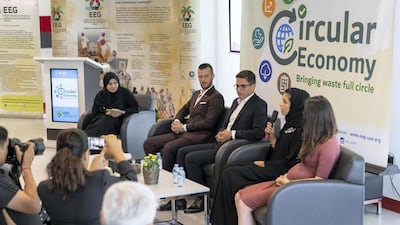Landlords and developers who fail to invest in their buildings risk facing unnecessary repair bills, an energy expert said on Tuesday.
Habiba Al Marashi, chairwoman of Emirates Environmental Group, said retrofitting air conditioning and planning for the long-term could help keep costs down.
Speaking at the Knowledge Summit in Dubai World Trade Centre, she said wise property owners were “proactive” in their approach to maintenance.
She called for retrofits of energy saving technology to be made a mandatory requirement in all buildings in the emirate.
“Wise property owners are being proactive and looking at ways they can increase the longevity of their buildings,” she said.
“If they make a long-term investment by retrofitting they won’t have massive repair bills every few years.
“It is to their advantage to make the changes now as there’s a chance it could become mandatory soon and when that happens the costs will be sky high,” she said.
Officials at Dubai Supreme Council of Energy have previously committed to reducing carbon emissions in the emirate by 30 per cent before 2030.
As part of that aim, authorities are encouraging home owners to install new lighting, water and air-conditioning products to help reduce consumption.
Dubai Electricity and Water Authority has said it will retrofit 30,000 buildings in Dubai by 2030.
It hopes to reduce carbon dioxide by a million tonnes and save 21.2 billion litres of water. The project is expected to save Dh82 billion in energy costs.
"Not having a mandatory [retrofitting] requirement means they can say, ‘Why should I do it? The law does not require me to do it,'" Ms Al Marashi said.
“They are being naive though and they will lose out. Consumers today are very knowledgeable.
“When they go to rent or buy they will want to know about the sustainability features of the property.
“They will ask about what they are being offered in terms of quality of life,” she said.
Ivano Iannelli, chief executive of Dubai Carbon, an environmental campaign group, said part of the problem was people putting quick fixes ahead of long-term gains.
“Retrofitting improves an asset but what happens is people don’t understand the value in making improvements,” he said.
“Quite often they’ll just try and paper over the problem. Some people think nothing of buying a new part for a faulty air conditioning unit at Dh1,000 a pop, instead of buying an entirely new unit for just a little bit more than that.
“You might think you are saving money by only replacing the part, but what happens if it breaks down five or six times?”
Mr Iannelli said it was a question of educating tenants and property owners on the financial benefits of having more energy efficient systems in their homes.
“Not retrofitting is like having a bucket with leaks and trying to patch it up instead of buying a new bucket with no holes in it,” he said.
“It doesn’t make any sense.”
Also speaking at the summit was Khalid Al Awadi, chief executive of the environmental health and safety sector for Dubai Municipality.
“Building owners need to change their mindsets,” he said. “The irrational consumption of energy resources must be rejected.
“If we do not protect our resources we will drown.”


